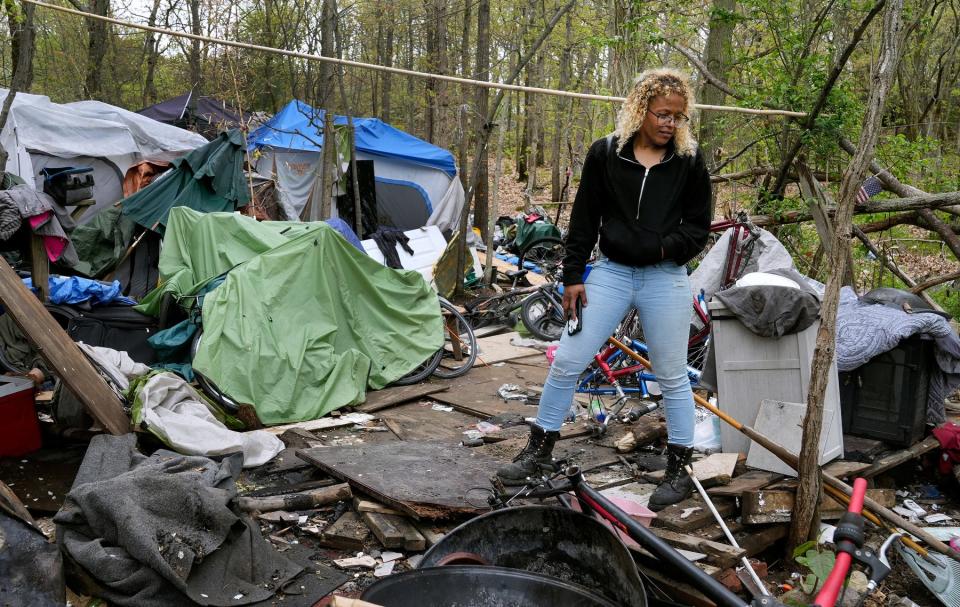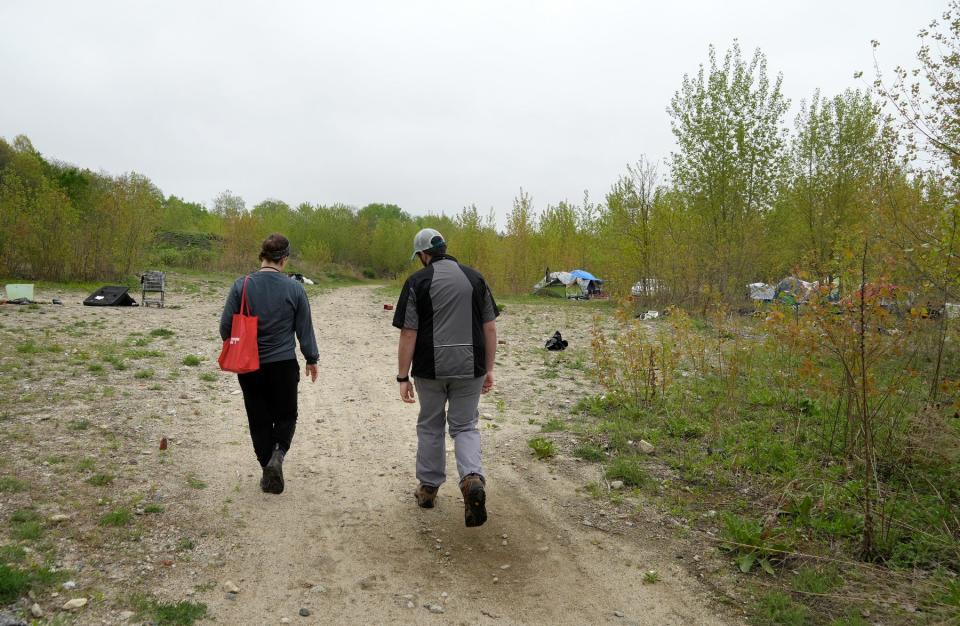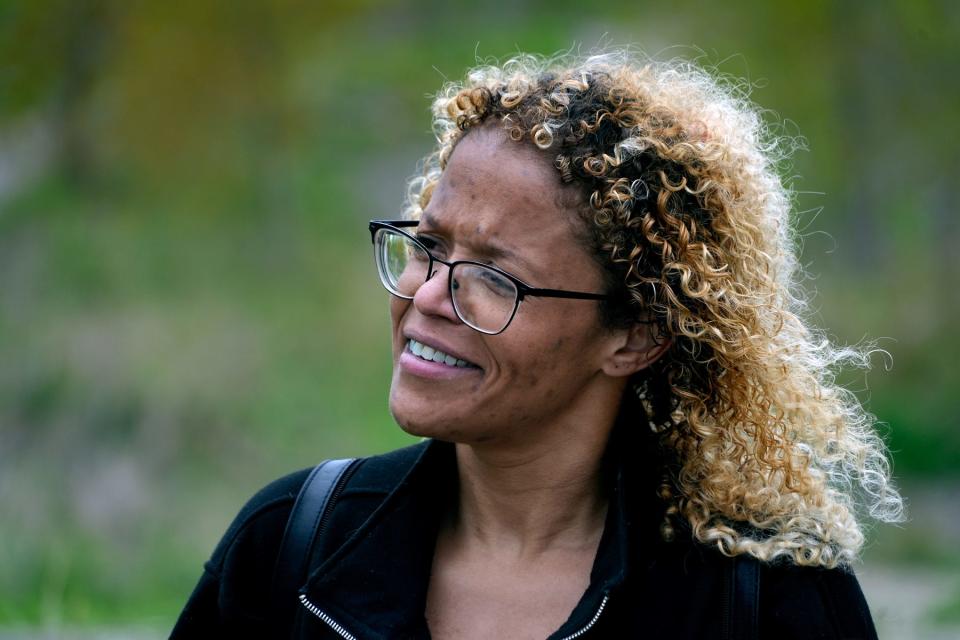Providence police will force two homeless encampments out. Where will they go?
PROVIDENCE − Dawn Barnett climbs up an embankment toward her home, cursing her decision to live at the top, or what she calls the "upstairs," in a cluster of three tents at a scattered encampment in the north end of the city.
The decision, when she moved to the encampment in September 2023, seemed sound. But after hauling groceries up a few times, or getting up and down after a snowstorm, living up on the hill seemed like less of a good idea.
Surrounding Barnett's tent grouping are bicycles under tarps, a grill and even a generator – though it needs some tweaking to get running.
In the "downstairs," below her tents, are fellow encampment residents. Further downhill, near the river, is the "basement." Naturally, as a basement, it periodically floods.

Encampment will be cleared this weekend
On Sunday, Barnett, 40, will be forced out of the place she calls home, along with 60 to 70 other residents, as Providence police push them out of two encampments with a standard 48 hours worth of notice.
The reason stated: environmental contamination of the land, making it a "dangerous" place for people to be there, and that it has been purchased, although no trespass order appears to have been issued.
The second encampment, along the banks of Interstate 95 near Branch Avenue, will also be evicted, this time ostensibly because they are not safe from speeding cars and because people have complained about seeing them.
Despite the given reasons, Mayor Brett Smiley has said it is the city's policy to break up every encampment that forms.
Those who work with the unhoused population say it will only lead to more health problems and more dangerous situations for people who have nowhere to go when there are 800 more people seeking shelter than beds available.
'No good options'
While the state has been adding a large number of shelter beds to its inventory, the number of people on the list for shelter beds has exploded since the pandemic, up to over 800 as of March, the latest data available.
Since the last data in March, 77 shelter beds have been removed from the system and by July, another 195 are scheduled to come offline. Currently, there are 1,603 shelter beds in the state system.
At least some of the 70 people being displaced by the police raids planned for Sunday will be added to that list, although many were already on it. Providers say that the few people who are getting shelter-bed placements are the highest need – those with debilitating medical conditions, amputated limbs or disabilities.
During a news conference on Tuesday, Mayor Brett Smiley could not say where the people in the encampments are supposed to go.
"It's a struggle and it's a case-by-case basis, which is why we are working with providers to find the best option and we know in some cases that there are no good options," Smiley said.
Smiley said the city's only job is to force people out of the encampments and it is incumbent on providers to find somewhere for people to go.
Advocates question Smiley's stance
House of Hope Executive Director Laura Jaworski said Smiley's rhetoric about working with providers is a microaggression and a fallacy.
"When we don't have enough shelter to go around, when people can't be sovereigns of their own destiny, and you sit here and say, 'you don't have anywhere to go but you can't say here,' you're ascribing things to empty options," she said. "When they say they're working with a provider, working with outreach, it doesn't do anything, and it assumes we're not doing it already. It undermines the integrity of the work we've done."
When Smiley says the city is "working with" providers while there are no shelter beds available (instead, a waiting list of over 500 people), it means nothing, Jaworski argued.
Smiley said the city cannot allow people to live in "truly unsafe circumstances," but when asked if the people being forced out of the encampments would actually be any safer, he said it is a "case-by-case basis."
It will look great for a week because all the visible homeless people that business owners, residents and drivers complain about will be gone, but it makes everything more difficult for providers and the unsheltered themselves, Jaworski said.
"Homelessness doesn't end, it just shifts off from one block to another block, deeper into the woods," she said.
Barnett said she does not know where she will go, although she thinks her partner has some leads on where they can camp, hopefully away from prying eyes. Bringing their possessions, including Barnett's welding equipment, will be an undertaking.
Welding, Barnett said, was a great source of money, but she hasn't been able to do it since she scratched one of her eyes. She is waiting on a medical contact lens to help her see, and hopefully weld, again.

Still a human looking for a place to sleep
Like everyone in the encampment, Barnett has a story.
She worked for 14 years as a therapist, bringing in a six-figure income, working up to 90 hours a week, she said. As she realized she was burning herself out, tired of listening to people fail to take accountability for their own actions, she found she was pregnant. She quit her job and had her daughter, and after nine months her partner left her.
She started working two jobs to get out of her parent's house and rules, finding it hard to find somewhere with no rental history, as rentals were always under her partner's name.
She met another man, fell in love, and then he died in an accident. She bopped around the South Coast – Taunton, New Bedford, Providence. She lived in rooming houses, crammed into one room with multiple people, and with her parents, obeying a curfew and other rules.
The encampment isn't great, with raccoons overturning piles of stuff and coyotes watching from afar, but it is better than most other options, she said. Barnett has been on the housing list for six years, but nothing ever comes up.
"I've done the hotel thing too," she said. "The cheapest is $50 a day, but you're always on the go, and then we tried the storage unit thing."

What is really dangerous?
Dr. Rebecca Karb, who provides medical care and outreach to the people in encampments, said the people she works with will be harmed, some significantly, by Smiley's order to disband them.
The people she sees in these encampments will be pushed elsewhere in the city or state and be harder to locate, meaning they can't get their medications, results from blood work, and follow-up care. Some people are being treated for Hepatitis C and if they miss a dose, they have to start the regime all over again.
Many of the people in the encampment had been living at Charles Street, the subject of a police raid and a confrontation between state contractors using a mulcher to shred people's belongings, and allegedly aimed it at people trying to leave the site.
In a commentary submitted to the Providence Journal, Karb wrote that encampments are dangerous, but less dangerous than the alternative.
"Communal living on the street provides safety, security for people’s belongings, companionship, and sharing of pooled resources to meet basic needs," she wrote. "Encampments allow couples, families, and pets to stay together when there are no adequate shelter options. Encampments also allow social service and medical teams reliable and consistent access to provide services and support to people experiencing homelessness."
For Barnett, the sense of safety that comes from the community in the encampment is incredibly important.
Encampment next to Crossroads Rhode Island to be cleared
Crossroads Rhode Island is working to get housing for the people living on a small strip of land between West Franklin Street and a fenced parking lot after city officials signaled they wanted them gone.
Crossroads President Michelle Wilcox said they had lunch with seven of the people living there last week and asked what they needed. Since then, at least two couples were relocated to a couples shelter. There is an even smaller supply of couples shelter in the state than there is for single beds.
The people living on the small patch of grass said they also need somewhere safe to store their belongings, and one couple has a pet. One person Wilcox talked to said it's incredibly hard to try to get a job or go to work when someone always has to be in the tent to guard their belongings.
House of Hope is trying to open a pallet-shelter village that would cater to the exact issues the couples near Crossroads are having: a safe place to keep their belongings, the ability to stay together as a couple and to keep their pets. State regulators have been holding up the process, which was slated to open this spring but is now pushed to this summer.
Journal reporter Patrick Anderson this week wrote about the nightmare of red tape holding up the pallet shelter here.
Wilcox said the Coordinated Entry System that places people in shelters gives priority to people with the most needs and, despite that prioritization, people with desperate need for shelter are still going without.
"The people on Friday, said they need suitcases, a vessel in which to put their stuff. That is a very concrete things we can provide," Wilcox said.
Thanks to our subscribers, who help make this coverage possible. If you are not a subscriber, please consider supporting quality local journalism with a Providence Journal subscription. Here's our latest offer.
Reach reporter Wheeler Cowperthwaite at wcowperthwaite@providencejournal.com or follow him on Twitter @WheelerReporter.
This article originally appeared on The Providence Journal: Providence will break up homeless encampments as waitlist for shelter beds grows

